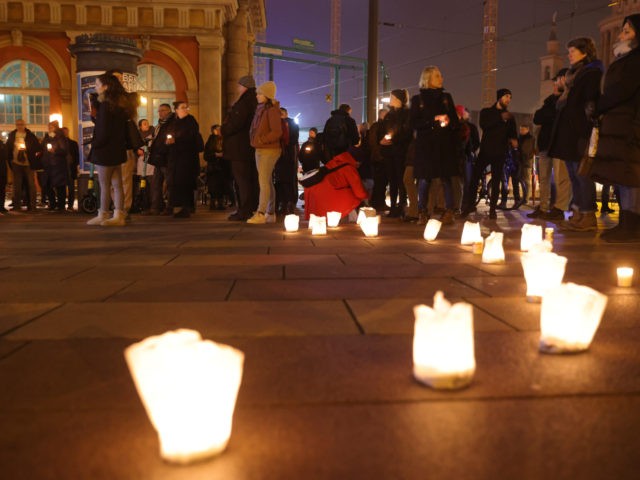Germans protesting against the country’s Wuhan coronavirus restrictions clashed with police on Sunday, as the government looks to crack down on encrypted messaging apps used to organise the demonstrations.
The outskirts of a protest, said to be mostly peaceful by police, in the Bavarian city of Schweinfurt turned violent on Sunday evening when a group of eight people violently attacked local police, punching and kicking officers who had allegedly wanted to identify them.
Two protesters, aged 30 and 34, attempted to set a police vehicle on fire and were arrested on charges of attempted arson, breach of the peace, and destruction of work equipment, German tabloid Bild reports.
In the Saxony municipality of Bennewitz, 25 people gathered on Sunday morning in violation of the region’s restrictions, which limit gatherings to ten people or fewer. A police spokesman said that when officers approached the group, the protesters attacked them.
“They behaved extremely uncooperatively, did not follow instructions, and attacked the police officers,” the spokesman said, adding that two officers and two protesters were injured as a result of the incident.
Later on Sunday evening, a protest was called in reaction to the incident and 350 people gathered but police later broke up the gathering.
Other protests also took place in Dachau that saw 750 people attend, in Rosenheim in which around 2,000 people gathered, and in Plauen where at least 226 people participated. All three of the protests were said to have been peaceful.
On Monday, Germany’s new Interior Minister Nancy Faeser, a member of the leftist Social Democrats (SPD), expressed an interest in taking action against the encrypted messaging app Telegram, which has been used by protesters to organise demonstrations and allegedly has also been used to call for violence against some politicians on certain channels.
“We must take more decisive action against incitement, violence, and hatred on the Internet,” Faeser said. So far, the Federal Office of Justice has initiated two proceedings against the company behind the app, but has not received a response.
Faesar said that like Facebook and Twitter, Telegram must be held to Germany’s Network Enforcement Act, which allows the government to demand posts be removed. “This means that obviously punishable content must be deleted within 24 hours, illegal content within seven days,” Faeser said.
Thuringia’s Interior Minister Georg Maier also spoke out about the anti-restriction protests, saying: “The propensity for violence at these meetings has increased significantly. We are also experiencing a certain ‘tourism’, in quotation marks, from obviously violent demonstrators from other federal states. That fills me with concern.”
“Telegram is no longer a pure messenger service, it has become a social platform. Demonstrations are advertised there, violence is also called for, and addresses of politicians are published there. So this is where action has to be taken,” Maier added.
The protests against the ongoing coronavirus restrictions come as new German Chancellor Olaf Scholz has given his backing to the idea of mandatory vaccinations for all and blamed the surge of recent coronavirus cases on unvaccinated residents of the country.

COMMENTS
Please let us know if you're having issues with commenting.